Introduction
In an era where mobile applications are the cornerstone of digital interaction, the demand for innovative concepts is more pressing than ever. As the e-commerce landscape is projected to reach a staggering $8.1 trillion by 2026, the need for creative solutions that captivate users and meet market demands is paramount.
This article delves into the latest trends and ideas that can revolutionize mobile app development across various industries. From harnessing the power of augmented reality to integrating gamification techniques, the exploration of user-centric designs and cutting-edge technology can significantly enhance user engagement and satisfaction.
By understanding the nuances of app development—from ideation to launch—organizations can position themselves at the forefront of this dynamic marketplace, ensuring their offerings not only stand out but also resonate with the evolving needs of consumers.
Exploring Innovative Mobile App Concepts
In an increasingly competitive digital landscape, innovation is paramount for capturing audience attention and fulfilling market demands. The mobile app development sector is on the brink of significant transformation, with the e-commerce market projected to surge to $8.1 trillion by 2026. This growth underscores the necessity for creative mobile app ideas that challenge traditional functionalities.
For example, incorporating gamification can significantly enhance participant involvement, making the interaction more enjoyable and engaging. Customized e-commerce solutions, supported by over 20 years of global expertise, can further improve key performance indicators (KPIs) such as retention rates and Average Order Value (AOV), while also generating additional revenue for your organization. Additionally, leveraging augmented reality (AR) can create immersive experiences that engage individuals and differentiate your app in a saturated market.
Furthermore, adopting low-code solutions empowers citizen developers, enabling them to innovate more rapidly; organizations that embrace this approach can score 33% higher on innovation and reduce development time by up to 90%. In 2021 alone, a staggering 2 million new mobile app ideas were created, according to MobiLoud, highlighting the rapid pace of innovation and the need for unique concepts that stand out. By embracing these trends and implementing tailored solutions that reshape industries—such as through enhanced customer insights and streamlined operations—you position your app for success in a dynamic marketplace.
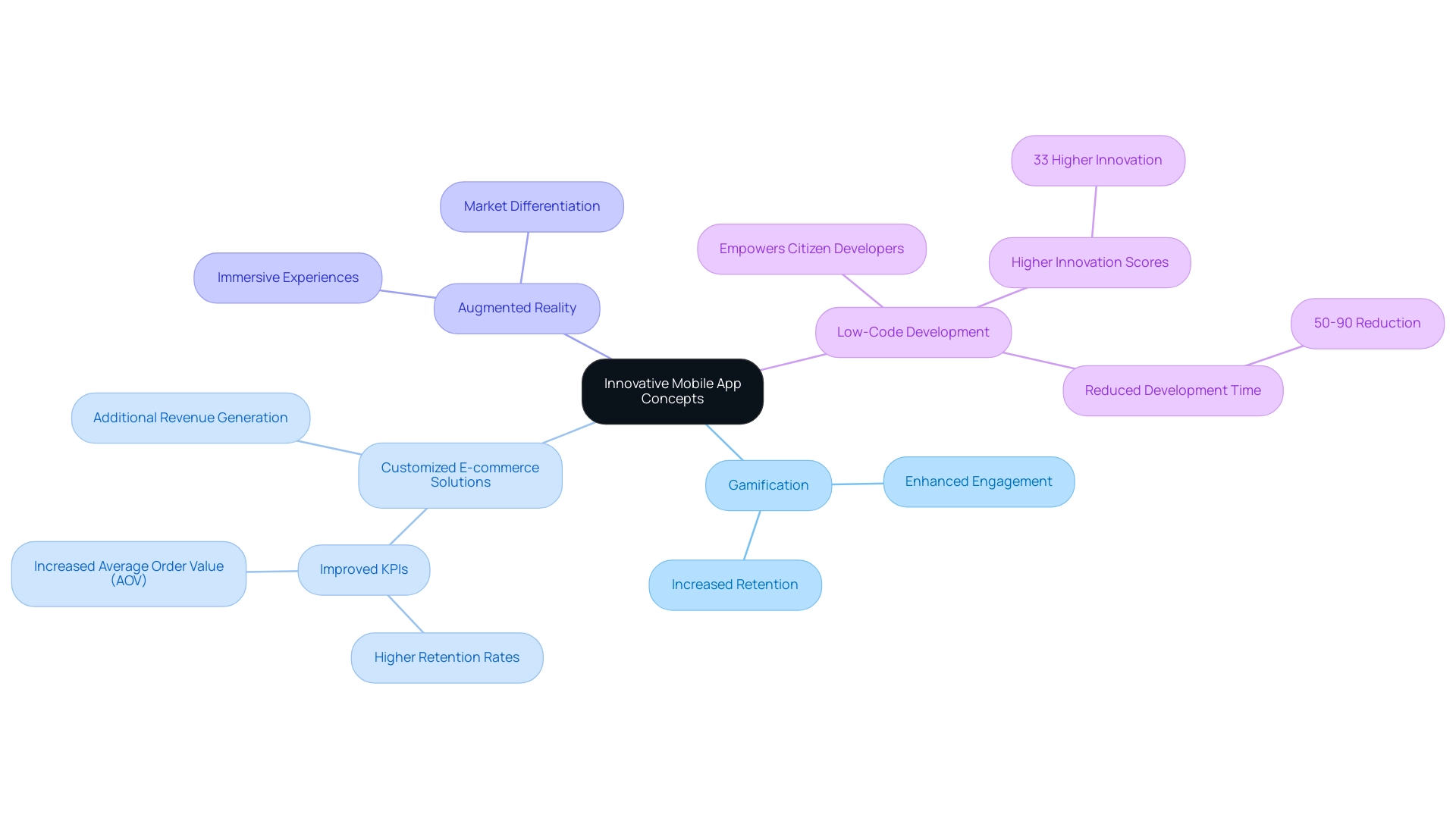
Diverse App Ideas for Different Industries
-
Healthcare Apps: The demand for convenient healthcare solutions is surging, driven by the need for effective patient engagement. Developing apps that enable remote patient monitoring, telehealth consultations, and medication reminders can significantly streamline workflows for healthcare providers. Notably, CareLink has secured $20 million in seed funding to enhance acquisition efforts, indicating strong financial backing and potential for growth in this sector. In 2024, the growth of healthcare mobile apps ideas is projected to reach unprecedented levels, reflecting a broader trend towards mobile health (mHealth) solutions. Addressing challenges such as engagement and data privacy is paramount for sustained success in this sector, particularly as outlined in our privacy policy, which underscores our commitment to safeguarding Personally Identifiable Information (PII). This is critical for building trust in mHealth applications, as highlighted in the case study 'Challenges Unveiled in mHealth Apps,' which emphasizes overcoming such obstacles. Our privacy policy outlines how PII is collected through interactions and is securely stored, ensuring individuals' data is protected.
-
Education Apps: The education app market is evolving rapidly, with a projected increase in adoption and investment in 2024. Creating mobile apps ideas for online learning, skill development, and interactive quizzes can cater to both students and professionals eager to upskill. This aligns with current trends indicating a shift towards digital education, emphasizing the importance of innovative educational concepts to keep pace with learner expectations while ensuring robust privacy measures to protect individuals' personal data. As stated in our privacy policy, we collect data only with consent and take necessary steps to secure it.
-
E-commerce Apps: In a growing competitive environment, e-commerce applications must provide personalized interactions to capture consumer attention. Incorporating features like personalized recommendations, augmented reality for virtual try-ons, and robust loyalty programs can significantly enhance engagement. As outlined in our privacy policy, understanding how Personally Identifiable Information is collected and used is essential for fostering a secure shopping environment. These innovations are crucial as e-commerce maintains its upward trajectory, with an emphasis on creating seamless and secure shopping interactions. Testimonials from individuals indicate that clear communication about data usage enhances their trust in these platforms.
-
Travel Apps: Travel applications that help individuals in organizing journeys, uncovering local activities, and offering language translation can significantly improve the journey. With travel rebounding post-pandemic, the demand for mobile apps ideas that are intuitive and user-friendly to simplify the travel process is on the rise. It’s crucial that these apps integrate strong privacy practices to ensure individuals feel secure when sharing their information. Our privacy policy outlines our commitment to protecting individual data throughout their travel planning experience.
-
The fitness app market is experiencing remarkable growth as individuals explore various mobile apps ideas for personalized fitness solutions. Creating applications that provide customized workout plans, nutrition monitoring, and community features can enhance motivation and accountability among participants. As health and wellness continue to be top priorities, these innovations are essential for engaging fitness enthusiasts and promoting healthier lifestyles. Importantly, maintaining transparency in how data is handled, as described in our privacy policy, will be key to building lasting relationships with individuals. Users have expressed appreciation for our clear data handling practices, which are designed to enhance their experience while ensuring their privacy is respected.
'When he’s not ruminating about various happenings in the tech world, he can usually be found indulging in his next favorite interest - table tennis.' - Tajammul Pangarkar, CMO at Prudour Pvt Ltd.
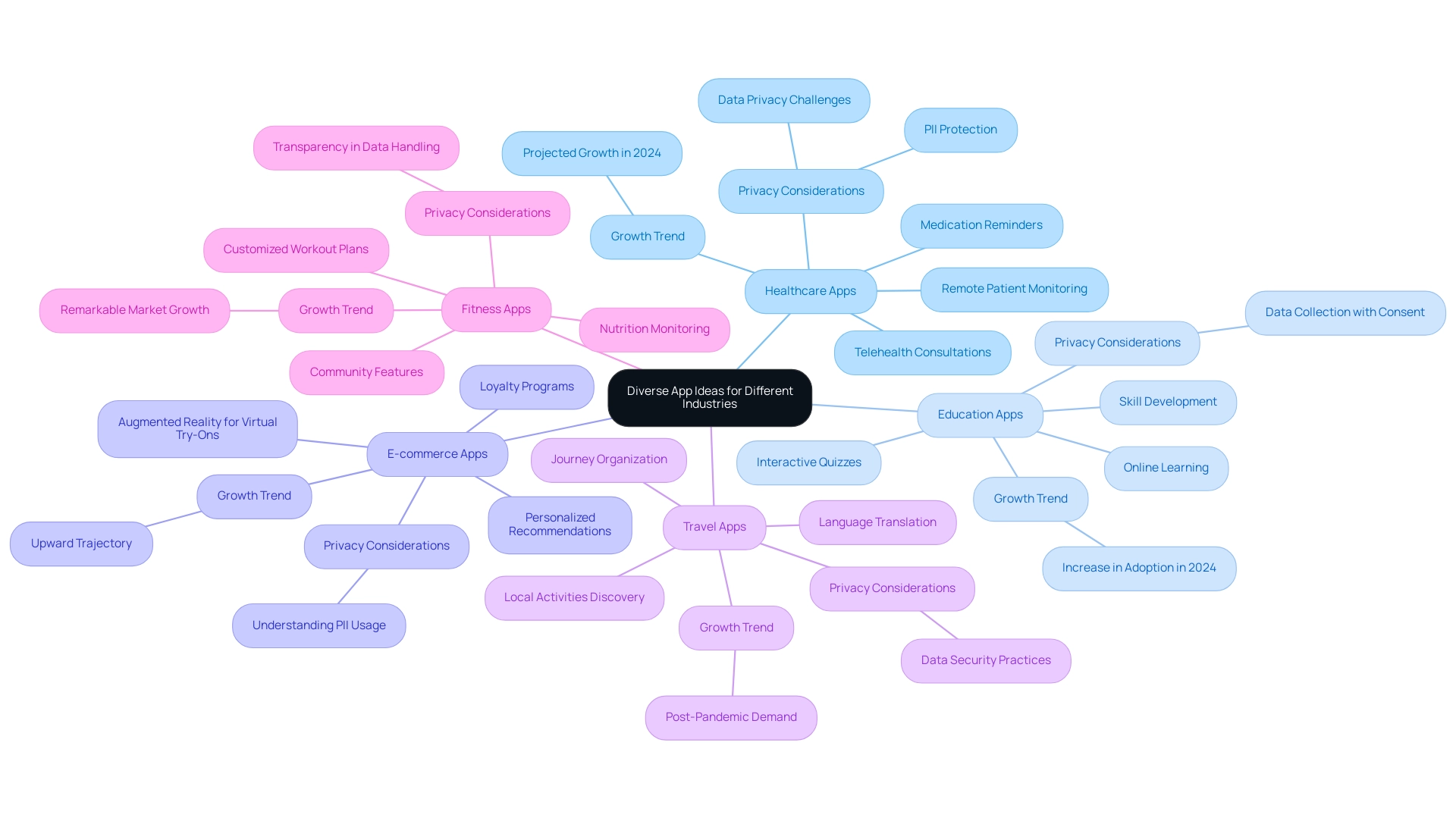
User-Centric App Ideas That Solve Real Problems
-
Mental Health Apps: Emphasizing the growing need for mental well-being support, these platforms can offer mindfulness exercises, therapy sessions, and community support. The Healthcare CMO Market is expected to surpass US$ 1,861.2 million by 2033, highlighting the financial potential of mobile apps ideas for mental health applications. With mental health app usage statistics projected to rise in 2024, developing mobile apps ideas that prioritize user-centric designs is crucial. Significant advancements in mental health applications include features that prioritize privacy, which is particularly relevant given the ongoing public health challenges, such as rising suicide rates. As highlighted by the International Telecommunication Union, 73% of individuals aged 10 and above have access to smartphones, facilitating widespread access to essential mental health resources. A successful example is the Sleep Cycle app, which utilizes sleep pattern analysis to enhance individuals' sleep quality, demonstrating the effectiveness of customer-centric design in addressing mental health needs.
-
Sustainability Apps: Develop applications that enable individuals to adopt eco-friendly practices. Features could include carbon footprint tracking, waste reduction tips, and sustainability challenges that promote engagement. Current trends in mobile apps ideas for sustainability reflect a growing demand for tools that not only educate but also promote actionable change. Successful implementations have demonstrated that when individuals are equipped with personalized insights, they are more likely to engage consistently with the app, thereby enhancing their commitment to sustainable living.
-
Financial Management Apps: Addressing the common financial challenges individuals face, these tools can assist individuals with budgeting, expense tracking, and investment strategies. A well-crafted financial application can enhance financial literacy, assisting individuals in making informed choices that align with their long-term objectives. As companies like Walmart Inc. and CVS Health Corporation continue to analyze financial performance data, the demand for mobile apps ideas focused on user-friendly financial management tools is becoming increasingly evident.
-
Time Management Apps: Innovate with applications that assist individuals in organizing tasks, setting reminders, and enhancing productivity. Effective time management strategies are essential in today’s fast-paced environment, and apps designed with user-centric features can significantly enhance efficiency. Incorporating elements that enable individuals to track their productivity patterns can lead to more tailored and effective time management solutions.
-
Community Engagement Apps: Foster a sense of belonging and participation by creating platforms that connect local residents with community events, volunteer opportunities, and neighborhood resources. These applications not only promote social engagement but also serve as vital tools for community development. By focusing on user-friendly designs that facilitate easy access to local information, these apps can help strengthen community ties and encourage active participation among residents.
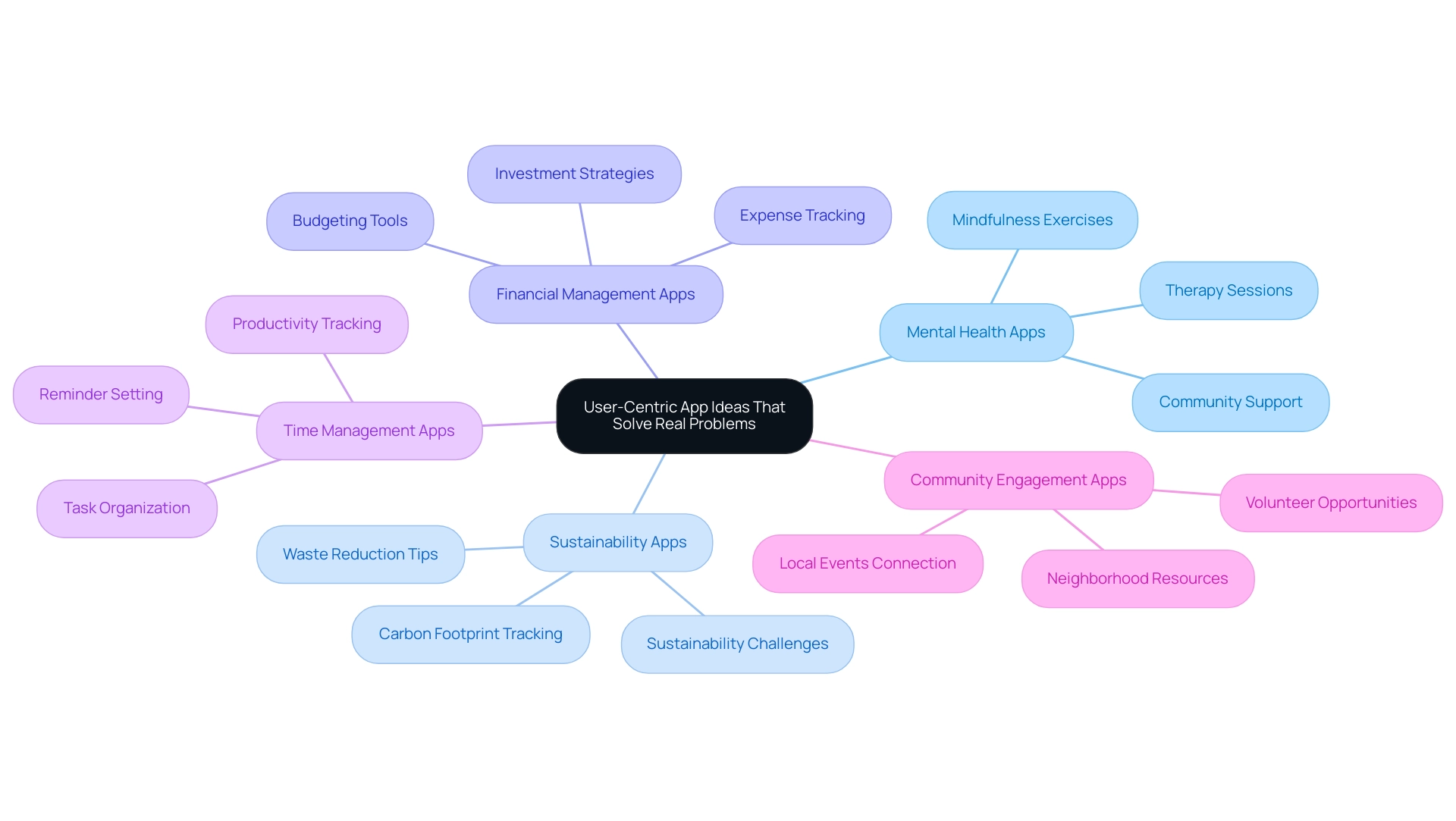
Harnessing Technology Trends for App Development
-
Artificial Intelligence: The integration of AI-driven features, such as chatbots for customer support or personalized content suggestions based on individual behavior, is becoming essential in mobile apps ideas. With 64% of consumers indicating that AI's primary purpose is to assist and empower them, leveraging these technologies can significantly enhance user engagement and satisfaction. Furthermore, while 94% of individuals express a desire to learn new skills to work alongside generative AI, a mere 5% of companies are currently investing in large-scale reskilling initiatives for their employees, indicating a significant opportunity for businesses that adapt quickly. This disparity highlights the need for companies to prioritize reskilling to remain competitive in an AI-driven market.
-
Augmented Reality: The augmented reality (AR) market is poised for substantial growth in 2024, with applications like virtual fitting rooms revolutionizing e-commerce and immersive educational tools enhancing learning experiences. Successful implementations have demonstrated that AR can increase customer interaction and conversion rates, making it a powerful tool for businesses looking to innovate.
-
Blockchain Technology: Exploring blockchain technology for secure transactions is vital, particularly in finance and supply chain management. This technology ensures transparency and trust, which are increasingly demanded by consumers. As AI becomes more integrated into daily life, there is a growing consensus—85% of respondents support national efforts to regulate AI for safety and transparency. This bipartisan support underscores the importance of robust security measures in app development, as businesses navigate the evolving regulatory landscape.
-
Internet of Things (IoT): Developing applications that seamlessly connect with IoT devices enables individuals to control smart home systems or monitor health metrics with ease. This trend reflects the increasing consumer expectation for interoperability and convenience within their digital ecosystems, making IoT integration a key consideration for future app development.
-
Voice Recognition: The integration of voice command features enhances accessibility and user convenience, particularly for hands-free operation across various applications. With 46% of business owners anticipating AI to produce responses, including emails, the demand for voice recognition technology is poised to increase, making it a significant trend among mobile apps ideas.
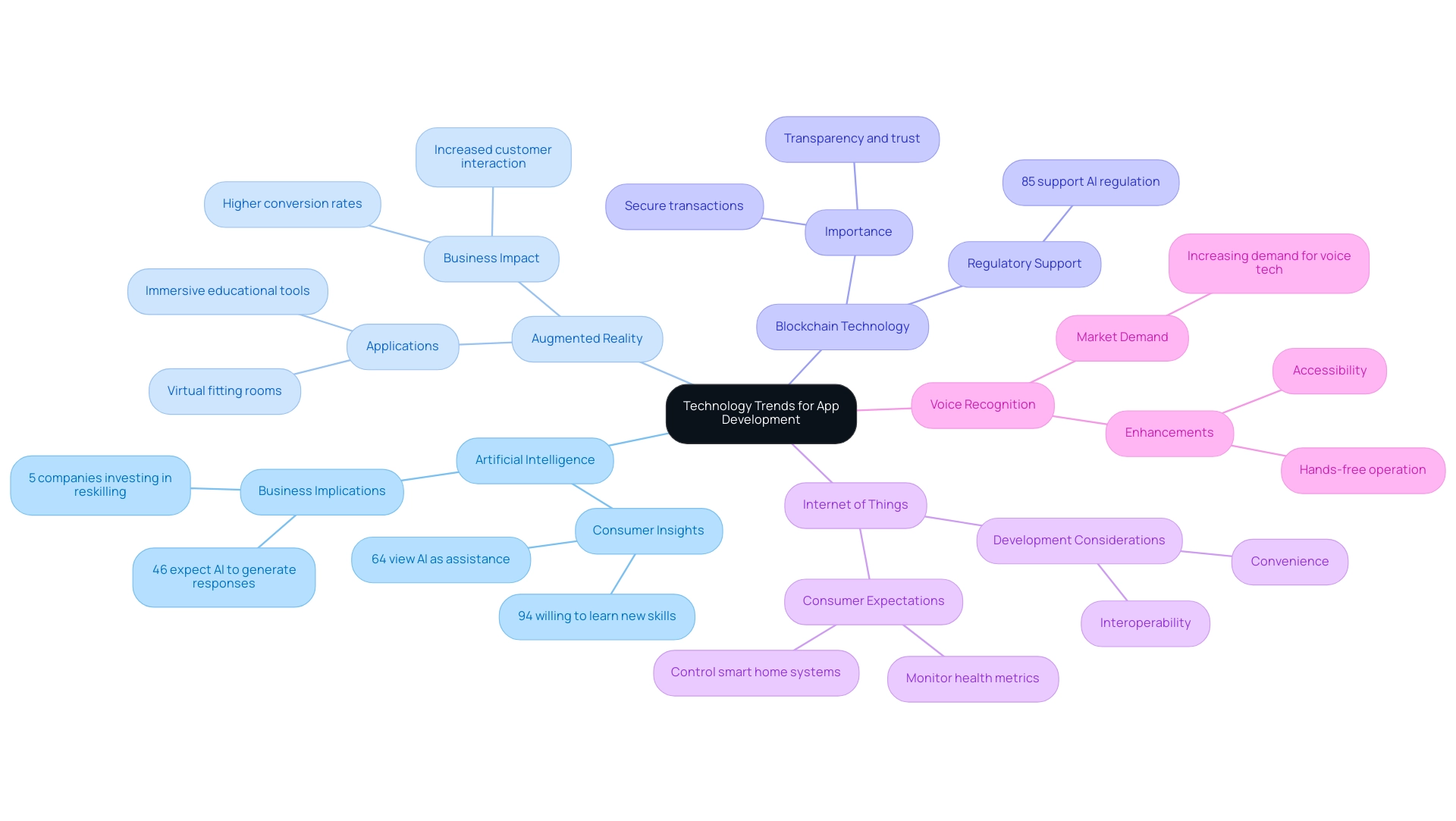
From Idea to Launch: Steps to Develop Your App
-
Research and Validation: Begin your app development journey by conducting comprehensive market research to validate your mobile apps ideas. It's essential to identify your target audience and assess their needs to ensure there is a genuine demand for your app. According to a poll conducted by Statista, messaging and social media apps are among the top three categories where individuals spend the most time, highlighting the potential market for engaging applications. This highlights the significance of validating mobile apps ideas by considering audience engagement trends.
-
Planning and Prototyping: Develop a detailed plan for your mobile apps ideas, outlining the app's features, functionality, and design. This stage is crucial, as it sets the foundation for your project. Creating prototypes for mobile apps ideas will help visualize the user interface and experience, allowing for early feedback and adjustments. Significantly, organizations employing low-code creation solutions can cut creation time by up to 90% while encouraging innovation; companies that enable citizen developers through democratized app creation achieve 33% higher on innovation compared to those using conventional methods. Utilizing low-code solutions can significantly improve your app creation processes.
-
Development: Select the appropriate technology stack tailored to your app’s requirements and initiate the development process, whether in-house or through outsourcing. A key focus should be on creating a seamless experience for individuals. With TikTok reaching over $6 billion in total consumer expenditure, it’s evident that engagement and satisfaction are directly linked to commercial success. Additionally, consider strategies employed by successful agencies like Udonis, which has acquired over 300 million individuals for mobile games since 2018, to inform your audience acquisition strategies.
-
Testing: Implement thorough testing protocols to identify and rectify bugs, ensuring your app performs optimally across various devices and platforms. This step is critical in delivering a polished final product that fulfills client expectations.
-
Launch and Marketing: Strategies a comprehensive launch plan, leveraging digital marketing techniques to effectively promote your app and attract individuals. Post-launch, it’s essential to monitor performance metrics and actively collect feedback for continuous improvement. Analyzing data and user behavior can provide insights that drive future updates and enhancements.
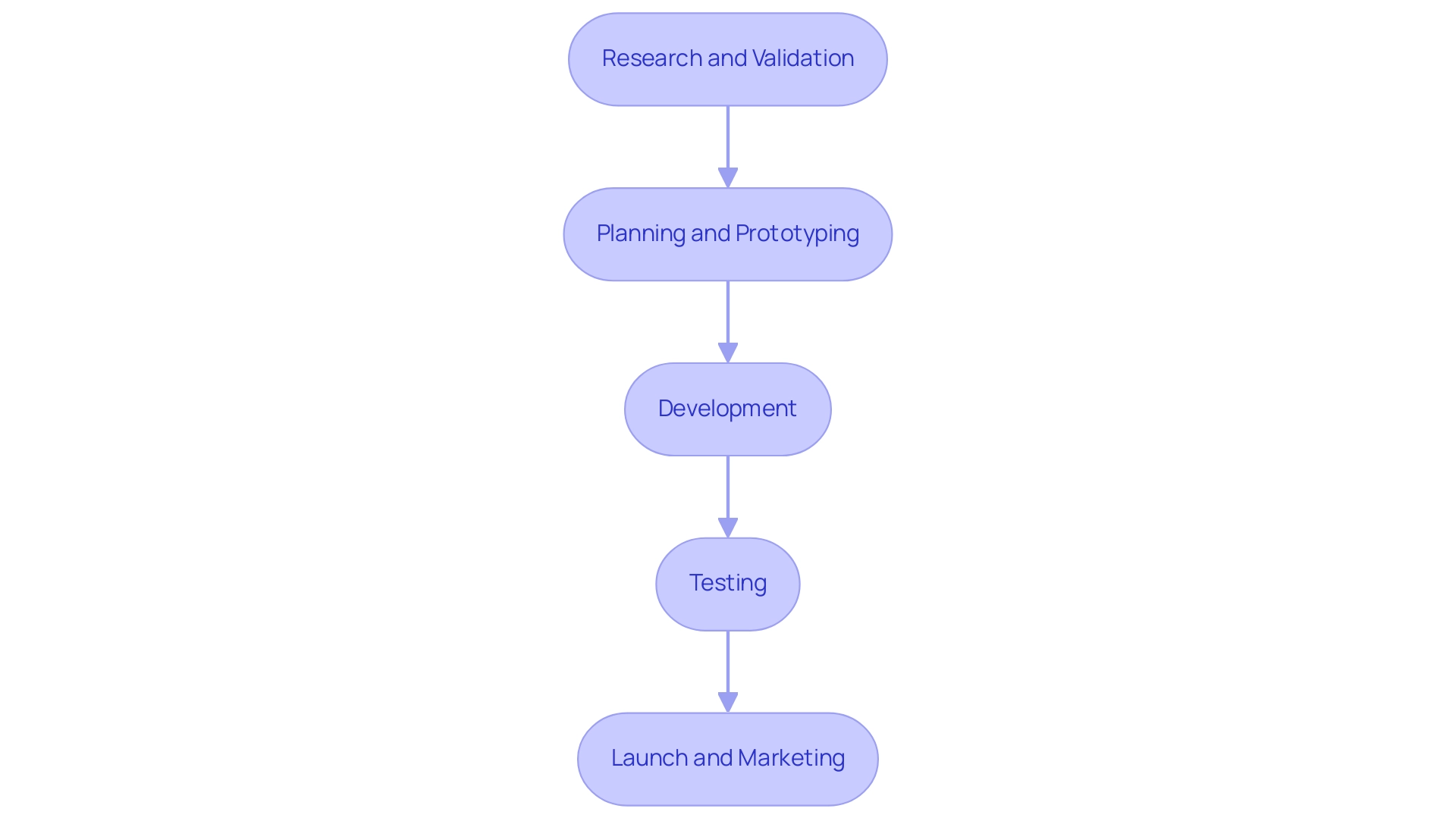
Conclusion
In the rapidly evolving mobile app landscape, innovation and user-centric design have become essential for success. As explored throughout this article, the integration of advanced technologies such as augmented reality and artificial intelligence can significantly enhance user engagement, providing immersive experiences that set applications apart in a crowded market. The potential of gamification and tailored e-commerce solutions further underscores the need for creativity in app development, allowing businesses to meet the diverse demands of consumers.
Various industries, from healthcare to education, are ripe for disruption through innovative app concepts that address real-world challenges. By focusing on user needs, such as mental health support or financial management, developers can create applications that not only attract users but also foster loyalty and trust. The importance of data privacy and transparency cannot be overstated, as these factors are critical for building lasting relationships with users in an increasingly digital world.
Ultimately, embracing the latest trends and technologies in mobile app development is not just a strategic choice; it is a necessity for organizations aiming to thrive in a competitive environment. By following a structured approach from research to launch, businesses can position themselves effectively and harness the full potential of their mobile applications. The future of mobile app development is bright for those willing to innovate and adapt, ensuring their solutions resonate with the evolving needs of users across the globe.





